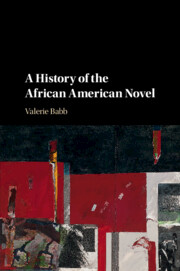Book contents
- Frontmatter
- Dedication
- Epigraph
- Contents
- List of Illustrations
- Acknowledgments
- PART I HISTORY
- Introduction: The Problem with the Title of this Volume
- 1 Out of Many One: The Beginnings of a Novelistic Tradition, 1850s– 1900s
- 2 Publish or Perish: African American Novels, 1900s– 1920s
- 3 Aesthetics of Race and Culture: African American Novels, 1920s– 1940s
- 4 Home of the Brave: African American Novels, 1940s– 1960s
- 5 Black Arts and Beyond: African American Novels, 1960s– 1970s
- 6 From Margin to Center: African American Novels, 1970s– 1990s
- 7 “Bohemian Cult Nats”: African American Novels, 1990s and Beyond
- PART II SIGNIFICANT GENRES OF THE AFRICAN AMERICAN NOVEL
- Coda
- Appendix
- Notes
- Works Cited
- Index
2 - Publish or Perish: African American Novels, 1900s– 1920s
from PART I - HISTORY
Published online by Cambridge University Press: 28 July 2017
- Frontmatter
- Dedication
- Epigraph
- Contents
- List of Illustrations
- Acknowledgments
- PART I HISTORY
- Introduction: The Problem with the Title of this Volume
- 1 Out of Many One: The Beginnings of a Novelistic Tradition, 1850s– 1900s
- 2 Publish or Perish: African American Novels, 1900s– 1920s
- 3 Aesthetics of Race and Culture: African American Novels, 1920s– 1940s
- 4 Home of the Brave: African American Novels, 1940s– 1960s
- 5 Black Arts and Beyond: African American Novels, 1960s– 1970s
- 6 From Margin to Center: African American Novels, 1970s– 1990s
- 7 “Bohemian Cult Nats”: African American Novels, 1990s and Beyond
- PART II SIGNIFICANT GENRES OF THE AFRICAN AMERICAN NOVEL
- Coda
- Appendix
- Notes
- Works Cited
- Index
Summary
The desire for a recognized tradition of letters articulated by so many late-nineteenth-century black writers began to manifest at the turn of the twentieth century. Ironically at a time when blacks faced increasing reactionary violence in post-Reconstruction America, African American novels gained greater access to the literary marketplace. Handsomely bound editions signified approval at a time termed a nadir by historians such as Rayford Logan. The elections of Hiram Revels and Blanche K. Bruce to the senate and John Mercer Langston to Congress, the passage of the Fourteenth and Fifteenth Amendments (the first guaranteeing formerly enslaved peoples the rights of citizens; the second, guaranteeing the franchise to African American men) seemed distant memories. In their stead was the rise of Southern Democrats determined to do away with black progress through laws instituting segregationist practices or through terror. Turn-of-the-century black novels countered this racial enmity by voicing progressive philosophies and pointing out that the victims of such hatred were not only African Americans, but also American democratic ideals. At a time when black life was increasingly penned in, black novels ventured out into mainstream publishing outlets, thus increasing their effectiveness as organs arguing for black equal opportunity. In some cases, their content made this argument; in others, the race of their writers did.
If one reads any assessment of the state of black American letters at the turn of the twentieth century, the name Paul Laurence Dunbar is ubiquitous. Not so ubiquitous is the name of the United Brethren Publishing Company where he subsidized the publication of his poetry collection Oak and Ivy (1893). Hadley & Hadley, Printers and Binders, where he and his friends, attorney Charles A. Thatcher and psychiatrist Henry A. Tobey, subsidized his second collection Majors and Minors (1896) was hardly better known. But the dialect poems (the “minors” in the title as contrasted to the standard English “majors”) caught the attention of William Dean Howells, as did the poet's portrait in the work's frontispiece. In describing his habit of encouraging unknown authors, Howells notes that when he saw the image that accompanied Dunbar's self-published edition he “felt a heightened pathos … from the fact that the face … was the face of a young negro, with the race traits strongly accented.”
- Type
- Chapter
- Information
- A History of the African American Novel , pp. 50 - 69Publisher: Cambridge University PressPrint publication year: 2017



